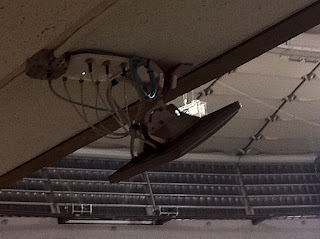How, you say?
Back in 2008, just days after B.C. Lions' president Bob Ackles died, I proposed that the field at B.C. Place Stadium be renamed in his honour. See my column from the Vancouver Courier below.
Had my advice been heeded, there would never have been a Bell Pitch. The Vancouver Whitecaps and B.C. Lions would both be playing on a field named for one of the most important people in B.C. sport history. Telus could very well have its name on B.C. Place by now and one of the promises to taxpayers (revenue from the sale of naming rights) would have been fulfilled.
As it stands, Telus has its hand out to government, expecting to be paid for services rendered and equipment installed. The only way to soften the blow would be for PavCo to complete the exclusive supplier contract that is being negotiated.
The taxpayers wait to learn the final cost of the budgeted $563 million renovation and they also wonder whether the business-friendly B.C. Liberal Party is able to govern anymore.
Remembering Bob Ackles
BY Bob Mackin, July 11, 2008
Bob Ackles is gone. Why is he missed so much? He represented the everyman. He demonstrated that you can start at the bottom and make it to the top through honest, hard work. He wasn't a scholar and he wasn't the scion of a tycoon. Ackles was a six-decade-long, rags-to-riches story that began in 1953 when he approached B.C. Lions' original head coach Annis Stukus on the West Side's Heather Park field. He got hired on the spot as the team's first waterboy.
Ackles' vocation was Canadian football, a sport that unites big cities and small towns, anglophones, francophones and immigrants. His job wasn't just helping put the best players in orange jerseys or putting bums in seats at B.C. Place Stadium. It was to foster the sport of Canadian football for all ages and abilities in B.C., and to ensure the Canadian Football League remained affordable family entertainment in a city hell-bent on world class status.
After 32 years with the Lions, Ackles stepped away in 1986 at the team's peak to find new career challenges in the National Football League. The ship was sailing just fine, thank-you, three years after opening B.C. Place, a year after winning a second Grey Cup. While he was gone, two of the team's owners nearly sunk the franchise. Hamilton auto parts magnate David Braley finally came along in 1997 and brought Ackles home in 2002 to save the team. That he did. The Lions are a proud symbol of B.C. again. Just look at how many people wear orange at home games. Not long ago, blue--the colour of empty B.C. Place seats--was the dominant colour under the dome.
Some have suggested that B.C. Place Stadium be renamed for Ackles. That's not going to happen. Ackles was a humble fella and wouldn't have wanted his name on the marquee. What's more, it should have been called Terry Fox Stadium from day one. B.C. Pavilion Corporation announced in February that the stadium's name would be sold to a corporate sponsor.
PavCo, a provincial Crown corporation, should look south to the example set in San Francisco. When Bill Walsh died last summer, the architect of the San Francisco 49ers' Super Bowl dynasty was commemorated with Bill Walsh Field at Monster Park, which has since reverted to the original Candlestick Park monicker.
The same gesture should happen here. I urge Premier Gordon Campbell and PavCo chairman David Podmore to dedicate the playing surface at B.C. Place to Ackles. Whenever someone steps onto the FieldTurf for any sport, they should be on Bob Ackles Field at B.C. Place Stadium.
Ackles never played a down for the Lions, but he was as important to the game as all the players who did. There are sometimes hundreds of little people behind the scenes at sporting events who get little recognition. Some are volunteers, who gain nothing but the sense of satisfaction.
Let's hear it for the waterboys--and the watergirls. Let's have Bob Ackles Field at B.C. Place Stadium.

